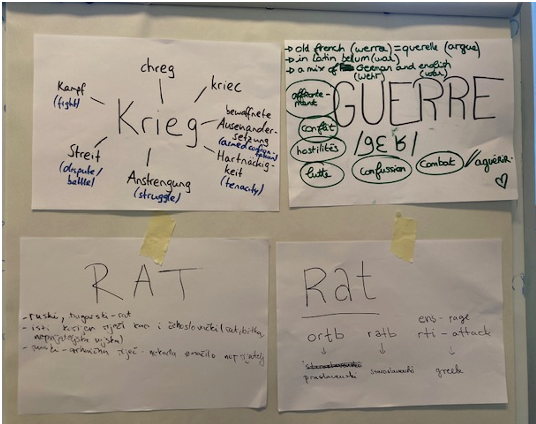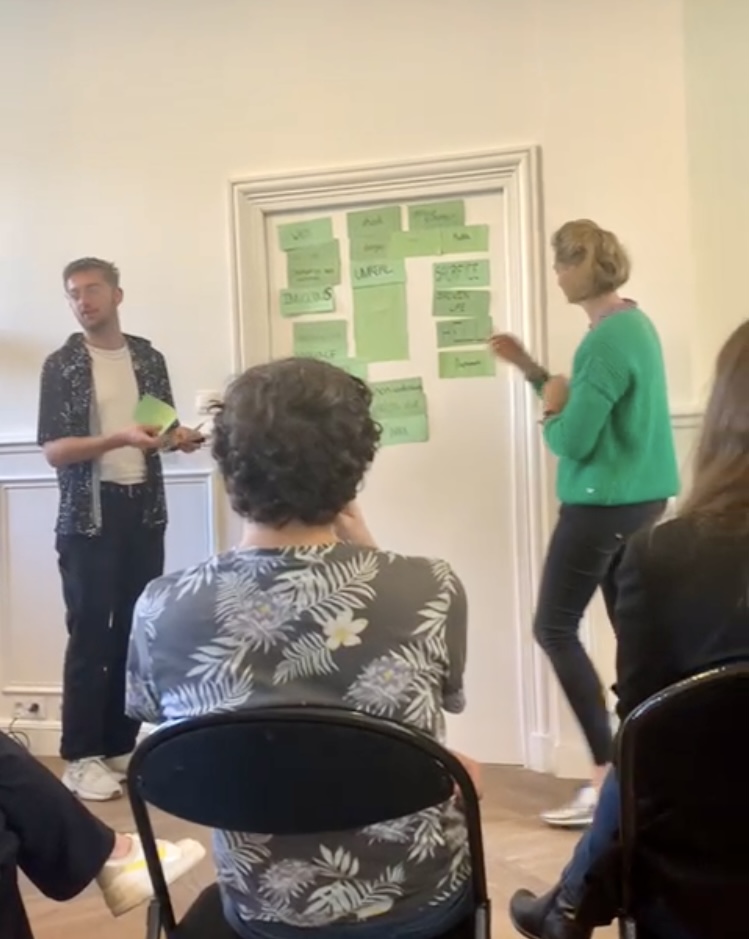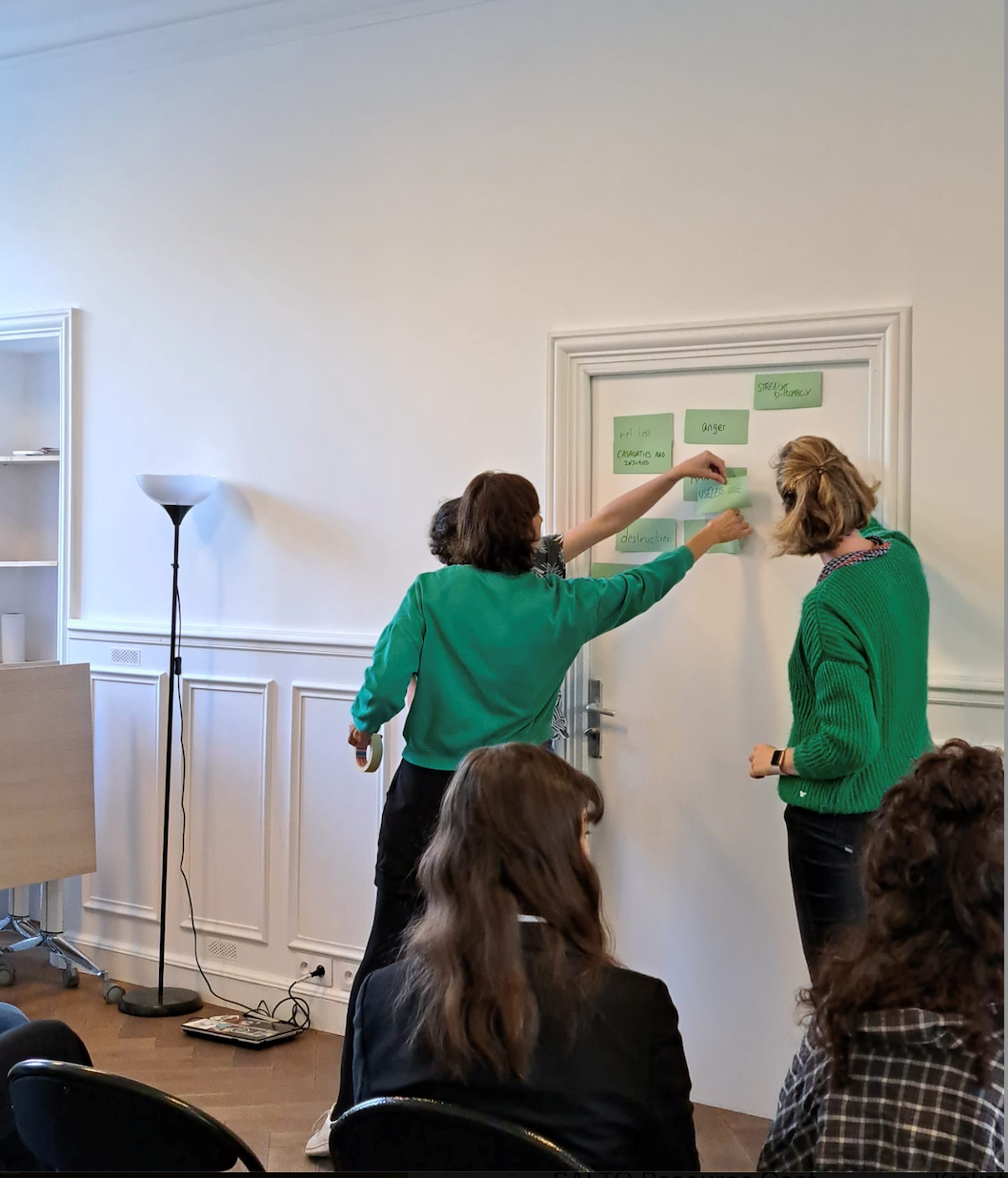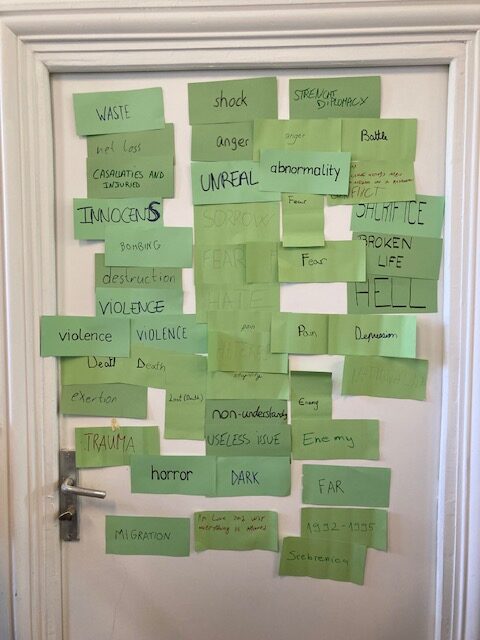4. Autour du mot « GUERRE »
Résumé
This first session explores the etymology of the word „war“. This is the first history-based method of the programme: its goal is to launch the theme of the project, namely „war“ and „wars“. The challenge here is to enter into the theme, meet the participants and let them get to know each other, and to lay the foundations of a relationship between the facilitator and the participants. This method is based on linguistic and historical elements, while taking into account the emotional aspects of each participant‘s experience.
Objectifs
- To introduce the historical topic
- To allow each participant to get to know each other on another level
- To develop critical thinking skills
- To introduce the subject while insisting on everyone’s freedom of speech and respect for everyone‘s sensitivities and stories
Mots-clés
- Guerre
- Histoire
- Brainstorming
- Etymology
- Language
- respect
- Empathie
Number of participants
15 à 20 personnes
Profil du groupe
- This activity is designed for young people, from middle school onwards. It is necessary that the participants have an interest in this theme as well as basic knowledge of the wars of the 20th century. They must also have a certain capacity for reflection and critical thinking in order to be able to listen, process information and argue. Finally, they must have the social skills of respecting and listening to others.
Durée
1 hour and 30 minutes
Matériel / préparation
- Board and/or flip chart
- Stickers
- Coloured cardboard sheets
- Markers, pens
- Adhesive tape
- Mobile internet access
Consignes
Short introduction (5 minutes): It is important to clarify from the start that the group is going to talk about war, a subject of historical study but with an emotional dimension. The facilitator must specify that participants should feel free to express their emotions at any time.
Step 1 (40 min): How do you say and write “war” in your language?
What is the etymology of this word? What are the synonyms?
- Young people are invited to build groups according to their country of origin.
- The different groups write the word “war” in their language on a sheet of paper, then check the etymology and synonyms by searching on Google and discussing.
- The participants get back together in the larger group. A participant from each group takes turns speaking in front of the entire assembly and presenting their findings. The participant writes the word on the board, and pronounces it. The team shall help and assist the participant if it is necessary.
- The facilitator asks everyone to repeat this word in order to learn it.
Step 2 (30 minutes): Brainstorming without preparation: what does “war” mean for
you personally?
- Each participant takes 3 stickers and writes 3 words.
- Each participant goes to the board to place their words and explains their choice
to the rest of the group. - Gradually, a cloud of words is forming.
- The facilitator organizes the words in different categories and makes comments
if necessary.
Expected categories: countries, historical dates, emotions, words about destruction/
violence/peace/different types of wars…
The team explains that all these aspects will be addressed and discussed during
the project.
Step 3 (10 minutes): Depending on the young people‘s responses and their personal
experiences, a moment intended to release the emotional charge can be considered. This can be, for example, a time of silence, breathing, or a drawing or free writing activity in a notebook, which can constitute a “companion” for the project. It can also be a simple feedback round, in which the participants can express how they feel about what they just heard (either in the entire assembly or in small groups)
Conclusion (5 minutes): The facilitator sums up: there are different words and different ways to speak about “war”.
Some participants may know of war just from the history books or the media, but other might in fact have experienced them first-hand. This means there are different “realities” in the approach of war.
The aim of this programme is to study “war” from a historical perspective, but also to compare different perceptions and points of view.
Recommandation pour la mise en œuvre
The team needs to be careful about following aspects:
Step 2: it’s important to say that there are no right or wrong answers. The facilitators should make it clear that everything written on the board – all the words – are part of the background and feelings of each participant. Everything is “correct”.
Step 3 is left to the discretion of the facilitators depending on the group, the maturity level of the participants, their reactions, and their personal history.

Production by the different groups

A participant (Samir Mrkovic) explains his choice to the other participants.

The facilitator helps participants to place their sticker on the wall

An example of a resulting word cloud